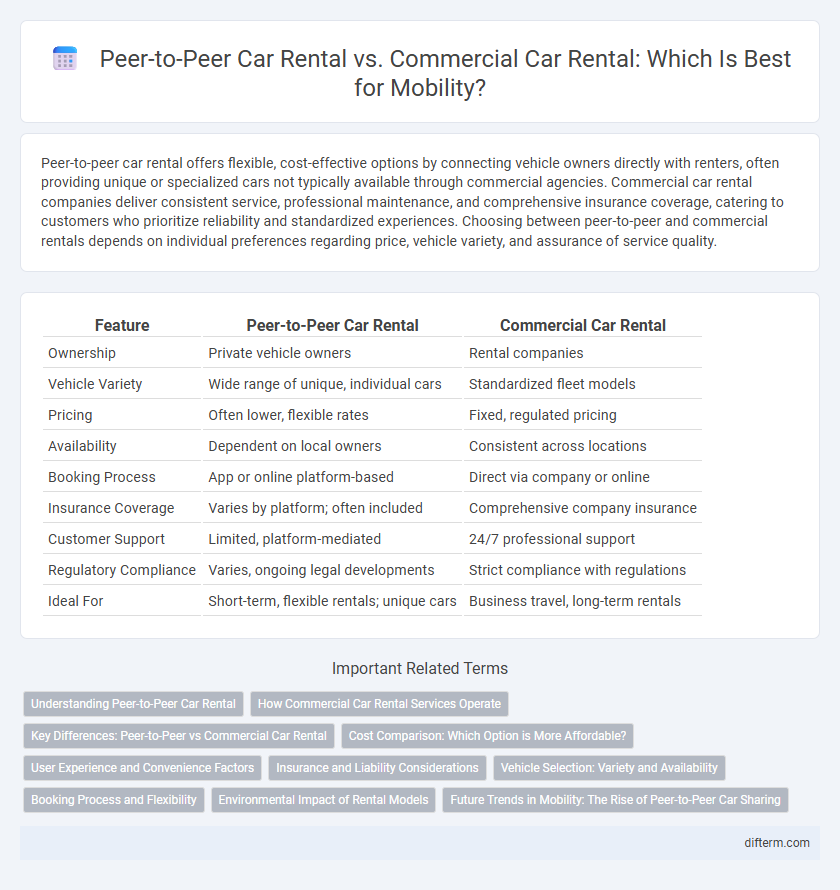Peer-to-peer car rental offers flexible, cost-effective options by connecting vehicle owners directly with renters, often providing unique or specialized cars not typically available through commercial agencies. Commercial car rental companies deliver consistent service, professional maintenance, and comprehensive insurance coverage, catering to customers who prioritize reliability and standardized experiences. Choosing between peer-to-peer and commercial rentals depends on individual preferences regarding price, vehicle variety, and assurance of service quality.
Table of Comparison
| Feature | Peer-to-Peer Car Rental | Commercial Car Rental |
|---|---|---|
| Ownership | Private vehicle owners | Rental companies |
| Vehicle Variety | Wide range of unique, individual cars | Standardized fleet models |
| Pricing | Often lower, flexible rates | Fixed, regulated pricing |
| Availability | Dependent on local owners | Consistent across locations |
| Booking Process | App or online platform-based | Direct via company or online |
| Insurance Coverage | Varies by platform; often included | Comprehensive company insurance |
| Customer Support | Limited, platform-mediated | 24/7 professional support |
| Regulatory Compliance | Varies, ongoing legal developments | Strict compliance with regulations |
| Ideal For | Short-term, flexible rentals; unique cars | Business travel, long-term rentals |
Understanding Peer-to-Peer Car Rental
Peer-to-peer car rental platforms connect private car owners with renters, offering a cost-effective and flexible alternative to commercial car rental companies. These services leverage user-generated reviews and trust systems to ensure vehicle quality and accountability. Peer-to-peer rentals often provide a wider variety of vehicle options and unique local experiences compared to standardized fleets of commercial rentals.
How Commercial Car Rental Services Operate
Commercial car rental services operate through a centralized fleet managed by rental companies, offering standardized vehicles that are maintained and insured according to strict industry regulations. Customers typically reserve vehicles through online platforms or rental locations, benefiting from consistent availability, professional customer support, and flexible rental durations. These services often include additional options like roadside assistance, insurance packages, and loyalty programs designed to enhance convenience and reliability for business and leisure travelers.
Key Differences: Peer-to-Peer vs Commercial Car Rental
Peer-to-peer car rental platforms connect private vehicle owners with renters, offering diverse options often at lower prices and increased flexibility compared to commercial car rental companies that maintain fleets of vehicles with standardized pricing and policies. Peer-to-peer rentals provide localized, unique vehicles but may involve variable insurance coverage and less predictable availability, whereas commercial rentals ensure consistent service quality, comprehensive insurance, and 24/7 customer support. Key differences also include booking processes, with peer-to-peer relying primarily on digital apps and owner agreements, while commercial rentals use formal contracts and established infrastructure.
Cost Comparison: Which Option is More Affordable?
Peer-to-peer car rentals often offer lower daily rates compared to commercial car rental companies due to reduced overhead costs and flexible pricing set by individual car owners. Commercial rentals typically include insurance, maintenance, and roadside assistance fees, causing a higher base price but providing standardized service and reliability. For short-term or occasional rentals, peer-to-peer options tend to be more affordable, while commercial rentals may offer better value for longer durations or business use.
User Experience and Convenience Factors
Peer-to-peer car rental platforms offer users personalized vehicle choices and flexible pick-up locations, enhancing convenience compared to traditional commercial car rental agencies that operate fixed locations and standardized fleets. User experience in peer-to-peer rentals benefits from direct owner communication, often resulting in more transparent pricing and tailored vehicle options, while commercial rentals provide reliability through established support services and consistent vehicle maintenance. The convenience of immediate booking via mobile apps in peer-to-peer systems contrasts with the potential wait times and paperwork typical of commercial rentals, appealing to tech-savvy customers seeking efficiency and customization.
Insurance and Liability Considerations
Peer-to-peer car rental platforms often provide limited insurance coverage that may require renters to purchase supplemental policies or rely on their personal insurance, which can vary significantly in scope and exclusions. Commercial car rental companies typically include comprehensive insurance options within their rental agreements, offering more predictable liability protection and standardized coverage limits. Understanding the differences in insurance policies and liability responsibilities is crucial for renters to mitigate financial risks associated with accidents or vehicle damage.
Vehicle Selection: Variety and Availability
Peer-to-peer car rental platforms offer a diverse vehicle selection ranging from economy cars to luxury models, often providing unique and locally available options not found in commercial fleets. Commercial car rental services typically maintain large inventories with standardized vehicle categories, ensuring consistent availability across multiple locations. Vehicle availability on peer-to-peer networks can vary based on user listings, whereas commercial rentals guarantee immediate access to a broad range of vehicles due to centralized fleet management.
Booking Process and Flexibility
Peer-to-peer car rental platforms offer a streamlined booking process through user-friendly apps and websites, allowing renters to directly connect with individual car owners for more personalized and flexible rental periods. Commercial car rental companies typically require reservations made in advance, with fixed rental durations and stricter pick-up and drop-off schedules that limit flexibility. The peer-to-peer model supports last-minute bookings and variable timeframes, catering to users seeking adaptable mobility solutions.
Environmental Impact of Rental Models
Peer-to-peer car rental reduces environmental impact by maximizing the use of existing vehicles, thus lowering the demand for new car production and decreasing carbon emissions. Commercial car rental fleets often involve higher resource consumption due to fleet maintenance, frequent turnover, and centralized logistics, which contribute to a larger carbon footprint. Studies indicate peer-to-peer platforms promote sustainability through efficient asset utilization and reduced vehicle manufacturing emissions.
Future Trends in Mobility: The Rise of Peer-to-Peer Car Sharing
Peer-to-peer car sharing platforms are rapidly transforming the mobility landscape by leveraging blockchain technology and AI-driven matchmaking to enhance user trust and experience. Forecasts indicate a 25% annual growth rate in peer-to-peer car rentals through 2030, driven by increasing consumer demand for sustainable and cost-effective transportation options. This rise challenges traditional commercial car rental companies to adopt hybrid models integrating digital platforms and on-demand services.
Peer-to-peer car rental vs Commercial car rental Infographic

 difterm.com
difterm.com